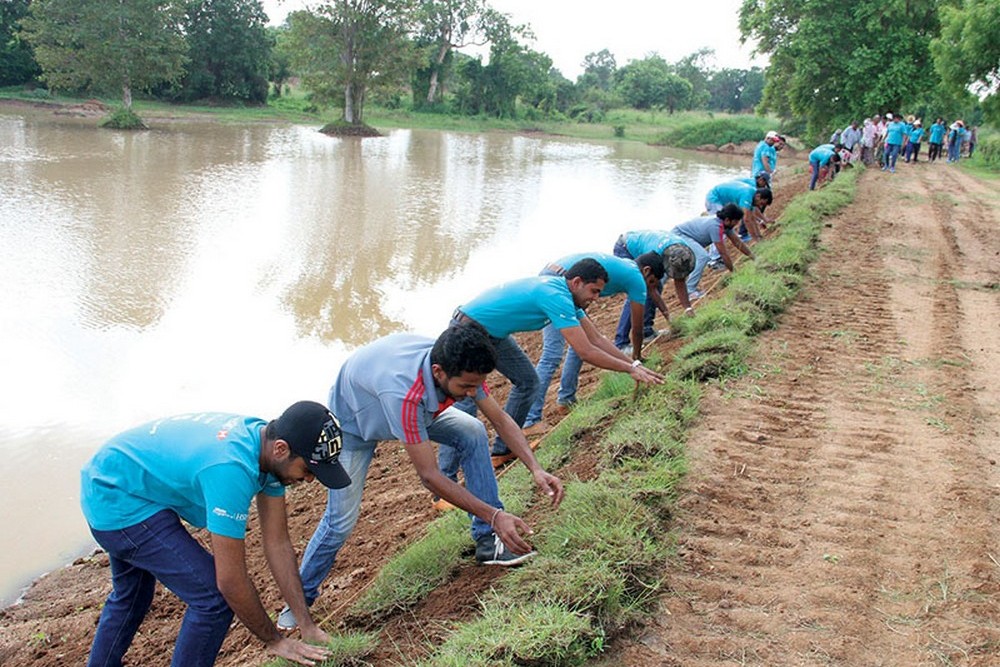
Ecological Restoration of a traditional cascading tank system in Anuradhapura
HSBC Sri Lanka

The project, a partnership between HSBC and the International Union for Conservation of Nature (IUCN), was designed to introduce an integrated and multi-stakeholder approach to address key issues such as low cropping intensity, tanksedimentation, high water losses, low productivity associated with the cascade tank system in Sri Lanka.
INTRODUCTION
The project, a partnership between HSBC and the International Union for Conservation of Nature (IUCN), was designed to address key issues such as low crop yields, tank sedimentation, high water losses and low productivity associated with the cascade tank system in Sri Lanka. The project focused on physical rehabilitation of tank related infrastructure, ecological restoration of the cascade tank associated natural and semi-natural environment, soil and water conservation, community empowerment, dissemination of knowledge and experience of the project to a wider audience, and to suggest policies for a better mechanism for restoring small tank cascades in Sri Lanka. By addressing the above issues in a more sustainable manner, the project aims to improve the productivity of the Kapiriggama cascade to improve the economy, health and wellbeing of the community, ensure the health of the environment of the area, and empower the villages as a self-reliance community with a rich cultural heritage.This successfully completed project can be used as a model to restore 457 other cascades in the North Central Province of Sri Lanka.
FRAMEWORK AND STRATEGY
Resource partners consisted of IUCN, Department of Agrarian Development (DAD), International Water Management Institute, Farmer Cooperative Societies, Department of Agriculture, Agriculture Engineering Department of the University of Peradeniya, Mahaweli Authority of Sri Lanka and Department of Irrigation and other local governing bodies.Communities from 11 villages in the Kapiriggama cascade were identified and then technically verified by the DAD. A series of technical assessments such as preliminary investigation of tank infrastructure, tank bed surveys, sedimentation surveys, etc. were carried out. The project empowered the Farmer Organizations to carry out identified rehabilitation work of the tanks and continuous assistance was provided throughout the process by technical officers of the project team. Once the project was completed it was making them the custodians of the tank system. The project team will support them on a consultant capacity for two years from the date of handover and will close the project once confident of communities’ capability to sustain the tank system independently.
ACHIEVEMENT AND IMPACT
Under the project, 18 small tanks were rehabilitated providing better irrigation to 600 farming families (or 2,400 people) from 11 villages. A reservoir leak, which caused the loss of half of its storage capacity was repaired thereby not only doubling the cultivation capacity but also making water available during the dry season. 38,000 sq.m of silt was removed from 5 reservoirs and 20,000m of soil conservation bunds were constructed to minimise soil erosion in 100 acres of farmland. In addition to these, over 250 farmers were trained on the preparation of organic fertilizers and bio-pesticides. Over 7,500 plants were planted to restore tank ecosystems around 13 tanks.
HSBC is one of the world’s largest banking and financial services organisations. We serve more than 47 million customers through four global businesses: Retail Banking and Wealth Management, Commercial Banking, Global Banking and Markets, and Global Private Banking. Our network covers 71 countries and territories in Europe, Asia, the Middle East and Africa, North America and Latin America.




